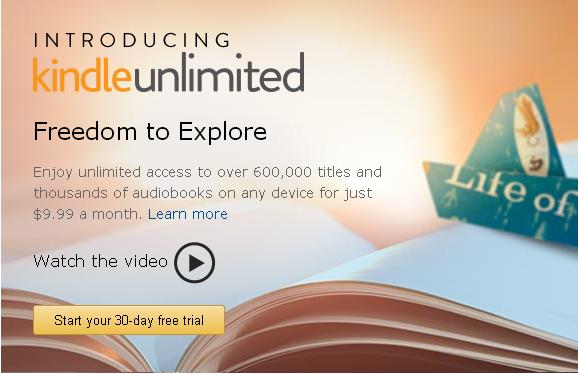Kindle Unlimited: Exclusivity Is Not Always Bad for Authors

5 Reasons You Should Self-Publish An E-book

4 E-book Formats Self-Published Authors Should Know About
Everyone is talking about Kindle Unlimited. Chuck Wendig thinks it’s bad for authors. Mark Coker thinks it’s bad. And I agree with them on why.
But I think it can be good for authors in a way that no one is talking about.
Why They Think Kindle Unlimited
Is Bad For Authors
I want to be clear.
If you publish all of your books to one distribution outlet, then you are limiting your exposure as an author and limiting your income potential. That’s a bad thing all around. And there’s the problem with Amazon’s Kindle Unlimited. It requires authors who want their books available to readers to agree to publishing those books nowhere but on Amazon. For the Kindle. Through KDP Select.
And that’s a bad thing.
But there is another way to look at this. Consider Kindle Unlimited as a marketing channel.
What Is A Marketing Channel?
Your job as indie author is to understand your audience. You should study your audience and understand the various marketing segments.
But I contend that this is a good kind of exclusivity. Here’s why.
Marketing channels are opportunities to reach a specific marketing segment, a particular subset of your broad reading audience.
For instance, Kindle readers are a marketing segment. You will never sell a book in the ePub format to a Kindle device owner. Except maybe on those rare occasions when the Kindle device owner really wants your book, it isn’t available in the Kindle format, and she is willing to convert your book into a format compatible with her reading device. But that’s another story entirely. Suffice it to say that Kindle readers are a segment of your reading audience.
As are Nook owners. And Android device owners. And people who read on their laptops.
Now break these segments down into smaller segments.
Some Kindle device readers may only read an indie author if they don’t have to buy his books, or they may want to try the first book with zero risk and expect to get it for free only to buy subsequent books if they are impressed enough to want to archive them. Or, they may decide that they like reading as many books as they want for one low price and have quit buying books completely.
It’s your job to know this.
Your job as indie author is to understand your audience. You should study your audience and understand the various marketing segments. You are likely doing this anyway. If not, you should be.
Granted, it can sometimes be difficult to break your audience down into these segments, but you can at least try.
How Kindle Unlimited
Can Be Good For Authors
I‘ll say at the outset that I have not tried this. I have not tested this prognostication, but I believe it has merit.
I am considering it.
Let’s say you poll your e-mail list subscribers and discover that a good number of them are Kindle Unlimited members. Many of them still buy books, but some of them don’t. Nevertheless, you segment those readers into a separate list you label “Kindle Unlimited Subscribers,” or KUS, for short.
How can you make your KUS feel special? Why not create periodic exclusive reading experiences for them? Write a story and offer it nowhere else but to your KUS. Not on your own website, not on Smashwords, and not at any other online bookstore. Call it a KUS exclusive. What a way to build loyalty with that audience segment!
You could do the same thing with Oyster, which uses the ePub format exclusively. You can publish your book through Smashwords and tell Smashwords to distribute your book to Oyster exclusively. Opt out of distribution to all other channels.
This builds audience segment loyalty.
I’m not saying you should do this with every book. You don’t want to give your entire writing career over to one bookstore, publisher, or distribution channel. But you can make exclusive offers through those channels to encourage brand loyalty. Think of it as a marketing tactic and use it sparingly.
Check out my free e-book conversion offer for indie authors.
Contact Allen Taylor or call
717-253-2306


